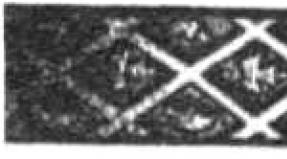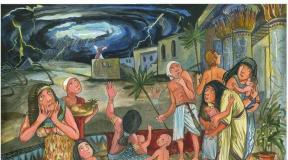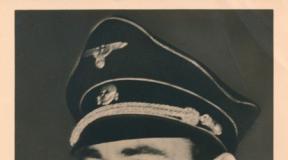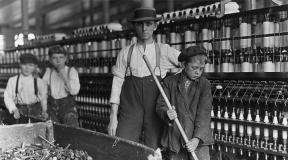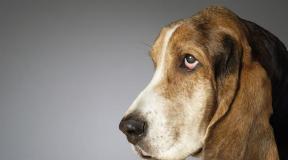Cerberus is the three-headed monster of the underworld. What is Cerberus in mythology? Who is Cerberus
Cerberus, also known as "Hound of Hades", is many-headed dog, which guards the gates of the underworld.
Although it devours anyone who tries to pass by, there is more to this creature than monstrous appearance and terrible activity.
Physical Description
As you might expect from a dog that guards the gates to the underworld, Cerberus is terrible monster. It has the body of a dog with shaggy bronze or black fur, but it ends with some normality of this monster.
At Cerberus there are several heads. Usually there are three, although some writers describe as many as a hundred with "eyes that flash fire" and three tongues in each of the mouths. Most argue that all these heads look like a dog.
Cerberus Tail slowly turns into a snake with a poisonous head at the end, from whose body others grow.
Some writers claim that these snakes form a mane around the head, while others describe the reptiles growing from the monster's spine or dangling all over the body like matted fur.
Personality
Despite his nightmarish appearance and position at the gates of the underworld, Cerberus is not a demonic being.
First of all, this mighty the dog was faithful. She was deeply devoted to her master named Hades.
Therefore, when he decided to make Cerberus one of the guardians of his kingdom, the monster also became devoted to his duties. The dog does two things: he does not allow living souls to enter the underworld, and the dead to leave it.
Anyone who tried to break those rules and slip past Cerberus was sure to be torn apart. Meanwhile, it is worth remembering that it was his duty given by the owner, not the accidental killing of innocent victims.
Cerberus able to be loving and affectionate and also loyal. The Greek writers portrayed him as "crouching" for the new souls that arrived in the underworld, greeting them with excited love.
The dog also had special relationship with Persephone, which was allowed to freely enter the underworld.
Legends of Cerberus
Adoption
Although Cerberus spent most of his life under the care of Hades, he was actually born at Typhon and Echidna.
Typhon was the deadliest monster in Greek mythology, being a huge dragon with a hundred heads and even more wings.
He spread fear and distress wherever he went, making even Olympic gods. Echidna was a half woman, half snake known as "mother of all monsters". She lived in a cave where only beloved Typhon.
Together Typhon and Echidna spawned the most feared monsters in Greece, among which Lernaean Hydra, Sphinx, Nemean Lion, Chimera and of course Cerberus .
Zeus allowed all these monsters to live, claiming that he saved himself by allowing the creatures to serve. challenges for Greek heroes. In fact, he was probably just afraid of provoking Typhon's wrath.
Most of these monsters were allowed to exist freely, but Zeus saw special potential in Cerberus. He took a young puppy and gave it to Hades to be raised as the guardian of the underworld.
Meeting with Orpheus
Hades was an excellent guardian, but was not invincible.
Orpheus became the first mortal who defeated Cerberus. He was revered in his kingdom for his amazing musical talents. His performance could make even the waters and rocks dance.
That's why when Orpheus fell in love into a beautiful nymph named Eurydice, he had no problem conquering her. But, Tragedy struck on their wedding day..
Eurydice has undergone attacked by satyrs, and then fell into the viper's nest, where got a fatal bite s, after which her spirit went to the underworld.
When Orpheus found his beautiful bride dead and cold in the viper's nest, he played on his lyre melodies so sad that all the nymphs and gods wept. They advised Orpheus to go to the underworld and try to soften Hades' heart. with your music.
But before Orpheus could reach Hades, he had to pass Cerberus.
He got as close as he could to the mighty dog that was sitting in its usual place guarding the gate to the underworld. Then, still hiding, Orpheus began to play a gentle lullaby.
His magic did not fail. Music made the dog so sleepy that she lay down and, in the end, began to snore.
Then the path of Orpheus to Hades became free. He entered to the underworld, knelt before Hades And Persephone and played his music.
The gods wept and agreed to let Eurydice return to him, but on condition that Orpheus would not look at her until until they return to the land of the living.
Then, with a joyful heart, he ran back to the entrance to the underworld, but not long before he returned to the world of the living, Orpheus looked over his shoulder to make sure Eurydice follows him. Instantly she became a ghost again and hid in the underworld.
Cerberus- a terrible monster, inspiring horror with one of its appearance. A powerful, strong, bestial body with three dog heads, frightening with a terrible grin of sharp fangs. A poisonous liquid flows from their mouths. On the back of the monster, instead of wool, venomous snakes writhe, ready at any moment to mortally sting. And to top it off - on the tail is the head of a monstrous dragon.
Cerberus owes its birth to a pair of some of the most disgusting creatures in history: Tephon (who had a hundred dragon heads, part of a human torso and writhing rings of snake bodies instead of legs) and a half-woman, half-snake Echidna. Cerberus had brothers and sisters as creepy as he was: Orc - a dog with two heads and tails, the Nemean lion, the Lernean hydra and. But it was the three-headed monster that was one of the mother's favorite cubs. From an early age, a parent tempered her child in an unbearably blazing flame of a fire-breathing volcano, which was supposed to bring eternal life.
For the ancient Greeks, the name Kerberos has always been associated with the word danger. Meeting him initially meant grief and death. After all, it was this monster who was entrusted with the mission of protecting the entrance to the realm of eternal oblivion, the territory of the dead. It was not in vain that Hades set just such a killer beast to meet the dead. When new arrivals appeared, the dog could joyfully wag his ugly tail, welcoming the new souls of the unfortunate. But up to a certain point, no one managed to get out of the eternal darkness. A terrible dog ruthlessly tore to shreds those who dared to make an escape.

Some sources say that even the new inhabitants of the kingdom Cerberus sought to bite when they met. In order to somehow appease the impregnable guard, it was customary to put a honey delicacy - gingerbread - into the coffin of the deceased.
By the way, in his Aeneid, Virgil mentions how Sibylla lulled Cerberus to sleep, feeding him the same sweet treat, after soaking him with hypnotic herbs, which put the animal to sleep and allowed Aeneas to enter the forbidden zone for the living.
In mythology, few cases are known when it was possible to break through such a powerful guard of a giant dog. Orpheus is described as one of the daredevils, who madly wanted to bring his beloved Eurydice back to life. Only thanks to his sweet-voiced singing, the young man managed to put the guard to sleep and pass the barrier. Unfortunately, it was not possible to break the girl out of the captivity of Hades, but Orpheus was one of the few who successfully managed to leave the kingdom of the dead.
Another mythical hero who visited the afterlife is the famous Hercules. He promised King Eurystheus that he would bring Cerberus to him. The great son of Zeus managed to persuade Hades to release the dog with him into the wild. To do this, Hercules needed to deal with the evil guard with his bare hands, without using any weapons. The fight was not for life, but to death: the head of the dragon, located on the tail of Cerberus, mercilessly bit the attacker, the snakes tried to sting with death-bearing stings. Hercules had to apply all his remarkable strength in order to win. He did not release his hands, closed around the dog's neck, until the dog fell at his feet in exhaustion.

Once on the surface of the earth and caught in the sun's rays, the animal raged and raged, growling and writhing. Saliva dripped onto the ground from its jaws, gaping in a terrible growl. A poisonous herb called aconite grew in these places. Despite everything, the winner kept his promise and delivered Cerberus to the eyes of King Eurystheus. He was in indescribable horror at the sight of the three-headed monster and ordered the monster to be sent back to the dark kingdom.
AND gay), a three-headed dog with a poisonous mixture flowing from its mouths (Theogony 310; Gigin. Myths 151). Cerberus guarded the exit from the realm of the dead Aida preventing the dead from returning to the world of the living. However, this amazing creature was defeated Hercules in one of his exploits.
Cerberus looked like a three-headed dog with a snake tail, on the back of a snake head, as creepy as his mother. According to other descriptions, he has 50 heads, or 100 heads, and in another mythology he is depicted with a powerful human body and hands and one head of a crazy dog. In one of the hands is the severed head of a bull, which killed with its breath, and in the other hand is the head of a goat, which struck the victims with its gaze. In works of vase painting, he was sometimes depicted as having two heads.
Before descending into the realm of the dead, Hercules was initiated into Eleusinian mysteries, then Bark accepted him as a brother. Hercules defeated Cerberus with Hermes And Athens. Cerberus vomited from daylight, and grass appeared from the foam from his mouth aconite. Hercules, when he brought out Cerberus, was crowned with the foliage of a silvery poplar. Hercules, leading him out of Hades, showed Eurystheus but then returned it. It was after this feat that Eurystheus released Hercules to freedom.
Etymology
According to one version, ancient Greek Kerberos can match Sanskrit सर्वरा sarvara, an epithet of one of the dogs of god pits, from Proto-Indo-European *ḱerberos"spotted".
Another etymology is proposed by Bruce Lincoln. He brings the name of Cerberus closer to the name of the guardian dog Garma (other scand. Garmr), known from Scandinavian mythology, raising both names to the Proto-Indo-European root *ger-"roar" (possibly with suffixes -*m/*b And -*r). Brothers and sisters. Orff, twin brother, two-headed and two-tailed dog. Orff guarded Gerion's cattle and was killed by Hercules during his abduction. Hydra ( lernaean hydra) - a monster born by Typhon and Echidna, has a hundred snake heads, defeated by Hercules. And Chimera, a monster with three heads: a lion, a goat and a snake, born of Echidna and Typhon. She was killed by Bellerophon.
In literature, art and science
Write a review on the article "Cerberus"
Notes
- into Russian in XVIII century, the form Cerberus entered in accordance with the late Latin pronunciation; however, since the 1920s, translations from ancient Greek and ancient studies have been dominated by the form Kerberos
- Myths of the peoples of the world. M ., 1991-92. In 2 vols. T.1. p.640
- Notes by M. L. Gasparov in the book. Pindar. Bacchilid. Odes. Fragments. M., 1980. S.480
- Hesiod. Theogony 769-774
- Hesiod. Theogony 312
- Horace. Odes II 13, 33
- Notes by V. G. Borukhovich in the book. Apollodorus. Mythological library. L., 1972. S. 154; Klein L. S. Anatomy of the Iliad. SPb., 1998. P.351
- Lycophron. Alexandra 1327
- Diodorus Siculus. Historical Library IV 25, 1; 26, 1
- Euripides. Hercules 613-615
- Homer. Odyssey XI 623-626, Homer does not mention three-headedness, Zhukovsky inaccurate
- Ovid. Metamorphoses VII 419; First Vatican Mythographer I 57, 2
- Theocritus. Idylls II 120; Notes M. E. Grabar-Passek in book. Theocritus. Moscow. Bion. Idylls and epigrams. M ., 1998. S.253
- Pseudo Apollodorus. Mythological Library II 5, 12; Hygin. Myths 30
- Pausanias. Description of Hellas II 31, 2; 35, 11
- Strabo. Geography VIII 5, 1 (p. 363)
- Pausanias. Description of Hellas IX 34, 5
- Xenophon. Anabasis VI 2, 2
- Virgil. Aeneid VI 417-423
- The Oxford Introduction to Proto-Indo-European and the Proto-Indo-European World. - Oxford University Press, 2006. - P. 411. - ISBN 0199287910.
- Lincoln Bruce. Death, war, and sacrifice: studies in ideology and practice. - Chicago: University of Chicago Press, 1991. - P. 289. - ISBN 9780226481999.
- Scholia to Homer. Odyssey XIX 518 // Losev A.F. Mythology of the Greeks and Romans. M ., 1996. P.126
- Theophrastus, fr.113 = Strabo. Geography X 4, 12 (p. 478)
- Hecataeus, fr.27 Jacobi = Pausanias. Description of Hellas III 25, 5
- Palefath. About incredible 39
- Heraclitus the allegorist. About incredible 33
- See Fulgentium. Mythologies I 6
Literature
- Kretschmar, Freda. Hundestammvater und Kerberos, Bd 1-2. - Stuttgart: Strecker und Schröder, 1938.(German)
|
||||||||||||||||||||||||||||||||||||||
An excerpt characterizing Cerberus
- To judge me for g "azboy - oh! Give me more water - let them judge, but I will, I will always beat the scoundrels, and I will tell the sovereign." Give me some ice, he said.The regimental doctor who came said that it was necessary to bleed. A deep plate of black blood came out of Denisov's hairy hand, and then only he was able to tell everything that had happened to him.
“I’m coming,” Denisov said. “Well, where is your boss here?” Showed. Wouldn't you like to wait. “I have a service, I arrived 30 miles away, I have no time to wait, report back.” Well, this chief thief comes out: he also took it into his head to teach me: This is robbery! “Robbery, I say, is not done by the one who takes food to feed his soldiers, but by the one who takes it to put it in his pocket!” So you don't want to be silent. "Good". Sign, he says, with the commission agent, and your case will be handed over on command. I go to the commissioner. I enter - at the table ... Who is it ?! No, just think! ... Who is starving us, - Denisov shouted, hitting the table with his fist of his sick hand so hard that the table almost fell and the glasses jumped on it, - Telyanin !! “How are you starving us?!” Once, once in the face, deftly it had to be ... “Ah ... rasprotakoy and ... began to roll. On the other hand, I am amused, I can say, - Denisov shouted, joyfully and angrily baring his white teeth from under his black mustache. “I would have killed him if they hadn’t taken him away.”
“But why are you screaming, calm down,” said Rostov: “here again the blood has gone. Wait, you need to bandage it. Denisov was bandaged and put to bed. The next day he woke up cheerful and calm. But at noon, the adjutant of the regiment, with a serious and sad face, came to the common dugout of Denisov and Rostov and regretfully showed the uniform paper to Major Denisov from the regimental commander, in which inquiries were made about yesterday's incident. The adjutant said that things were about to take a very bad turn, that a military judicial commission had been appointed, and that with real severity regarding looting and self-will of the troops, in a happy case, the case could end in a dismissal.
The case was presented by the offended in such a way that, after repulsing the transport, Major Denisov, without any call, appeared in a drunken state to the chief provisions master, called him a thief, threatened to beat him, and when he was taken out, he rushed to the office, beat two officials and dislocated one arm.
Denisov, to Rostov’s new questions, laughingly said that it seemed that some other one had turned up here, but that all this was nonsense, nothing, that he did not even think to be afraid of any courts, and that if these scoundrels dare to bully him, he will answer them so that they will remember.
Denisov spoke dismissively about the whole affair; but Rostov knew him too well not to notice that in his heart (hiding this from others) he was afraid of the court and was tormented by this affair, which, obviously, was supposed to have bad consequences. Every day, paper requests began to arrive, demands for the court, and on the first of May Denisov was ordered to hand over the squadron to the senior officer and report to the headquarters of the division for explanations on the case of the riot in the provisions commission. On the eve of this day, Platov made reconnaissance of the enemy with two Cossack regiments and two squadrons of hussars. Denisov, as always, rode ahead of the chain, flaunting his courage. One of the bullets fired by the French riflemen hit him in the flesh of the upper leg. Maybe at another time Denisov would not have left the regiment with such a light wound, but now he took advantage of this opportunity, refused to appear in the division and went to the hospital.
In June, the Battle of Friedland took place, in which the Pavlogradites did not participate, and after it a truce was announced. Rostov, who felt hard the absence of his friend, having had no news of him since his departure and worrying about the course of his case and wounds, took advantage of the truce and asked to go to the hospital to visit Denisov.
The hospital was located in a small Prussian town, twice ruined by Russian and French troops. Precisely because it was summer, when the field was so good, this place, with its broken roofs and fences and its filthy streets, ragged inhabitants and drunken and sick soldiers wandering around it, presented a particularly gloomy spectacle.
In a stone house, in the courtyard with the remains of a dismantled fence, frames and glass broken in part, a hospital was located. Several bandaged, pale and swollen soldiers walked and sat in the yard in the sun.
As soon as Rostov entered the door of the house, he was overwhelmed by the smell of a rotting body and a hospital. On the stairs he met a Russian military doctor with a cigar in his mouth. A Russian paramedic followed the doctor.
“I can’t burst,” said the doctor; - come to Makar Alekseevich in the evening, I'll be there. The paramedic asked him something else.
- E! do as you know! Isn't it all the same? The doctor saw Rostov going up the stairs.
“Why are you, your honor?” the doctor said. - Why are you? Or the bullet did not take you, so you want to get typhus? Here, father, is the house of the lepers.
- From what? Rostov asked.
- Typhoid, father. Whoever ascends - death. Only the two of us with Makeev (he pointed to the paramedic) are chatting here. At this point, five of our brother doctors died. As soon as the new one arrives, he’ll be ready in a week,” the doctor said with visible pleasure. - Prussian doctors were called, so our allies do not like it.
Rostov explained to him that he wished to see the hussar major Denisov lying here.
“I don’t know, I don’t know, father. After all, you think, I have three hospitals for one, 400 patients too! It’s also good, the Prussian ladies of the benefactor send us coffee and lint at two pounds a month, otherwise they would be lost. He laughed. - 400, father; and they keep sending me new ones. After all, there are 400? BUT? He turned to the paramedic.
The paramedic looked exhausted. He evidently waited with annoyance to see if the chattering doctor would leave soon.
“Major Denisov,” repeated Rostov; - he was wounded near Moliten.
- Looks like he's dead. What about Makeev? the doctor asked the paramedic indifferently.
The paramedic, however, did not confirm the words of the doctor.
- Why is he so long, reddish? the doctor asked.
Rostov described Denisov's appearance.
“There was, there was such a person,” the doctor said as if joyfully, “this one must have died, but I can handle it, I had lists. Do you have it, Makeev?
Ancient Greek myths surprise with the originality of the characters. However, with Cerberus, the inhabitants of Hellas did not become particularly wise, although they endowed the animal with frightening features. Who else will guard the approaches to the most terrible place on earth - the kingdom of the dead? Of course, a dog, albeit not quite an ordinary one.
Origin and image
Cerberus in ancient Greek mythology is perhaps the most terrible creature that can terrify even the most brave hero and warrior. In Latin, the name of the hellish dog is listed as "Cerberus", which means "souls of the dead" and "devourer". The ugly monster is the offspring of Typhon and Echidna.
The giant and the gigantic half-woman half-snake gave birth to two more children, a brother and sister Cerberus. No less monstrous dog Orf with two heads guarded the herd that belonged to the giant Geryon, and the Lernean Hydra, a snake-like creature with poisonous breath, guarded the underwater entrance to the kingdom of the dead.
Cerberus, of course, also got the fate of a watchman, but compared to his brother and sister, he enjoyed the most respect for his bad temper and excessive aggressiveness.
The appearance of the mythological character makes the creepy image complete. The back is crowned with three heads with evil eyes, a long snake tail flaunts on the back of the body, ominous snakes teem on the neck and stomach. However, according to other sources, the creature is represented with fifty or even a hundred heads. And in the Roman era, the middle head was a lion's head. Sometimes Cerberus even looks like a man with a dog's head.
The ancient Greeks depicted the mouth of Cerberus with sharp fangs. A poisonous mixture of white color flowed from the tongue of the dog. According to legend, when Hercules pulled the monster out of the dungeon, Cerberus vomited on the ground from the sunlight. As a result, the herb aconite grew, from which Medea later prepared deadly potions.

The dangerous dog's life's work was to serve God faithfully. The duty of Cerberus is to guard the exit from the world of the dead, so that not a single soul that has gone "to the next world" can return to people. And, as is known from the myths, attempts to escape were not uncommon. At the same time, the dog greets new guests (necessarily deceased) cordially, wagging its tail cutely. An aggressive creature is not so hospitable to living souls, therefore, in the legends, the heroes try to bribe it in every possible way. For example, who came for a dead lover, delighted the ears of Cerberus with the sounds of a lyre and eventually put the sinister dog to sleep.
Cerberus and Hercules
The three-headed dog is strong and fearsome. Attempts to defeat the guard of Hades were made more than once, but only a brave strong man managed to do this. The story of the pacification of the monster from the underworld was the 12th, final feat of the hero. The evil king Eurystheus, who wondered to destroy Hercules, asked the ancient Greek hero to bring the legendary dog to the throne.

Hades just didn’t want to give up his faithful guard - he made concessions only after the hero hit his shoulder with an arrow. The ruler of the underworld allowed Cerberus to be taken away, but on one condition - if Hercules defeats him without weapons. A glorious warrior dressed in lion skins and attacked a fierce animal, trying to strangle it. Cerberus did not manage to fight off the intruder with a dragon's tail and fell at his feet.
At the sight of the monster, the cowardly king Eurystheus was horrified, and he freed Hercules from hard work. And by the way, he ordered the dog to be returned to its place in the underworld.
In literature and cinema
Cerberus often becomes the hero of literary works, and also appears on movie screens.
In ancient Greek and Roman literature, the character is found in, and. In The Divine Comedy, Cerberus is the guardian of the third circle of hell, where gluttons and gourmets suffer, who are destined to rot in the pouring rain and the ruthless rays of the sun.

Writers sometimes use the image of a three-headed dog in an allegorical sense. in the work “Journey from St. Petersburg to Moscow”, already in the epigraph, he began to criticize the autocracy with the words: “The monster is oblo, mischievous, huge, staring and barking.” The expression is mixed from two fragments of Virgil's Aeneid, which speaks of the Cyclops Polyphemus and Cerberus. Later, the line turned into a catchphrase used to describe any negative event that has a public resonance.
Modern literature also uses the image of this infernal monster. In the novel "Harry Potter and the Philosopher's Stone", Cerberus, although scary, is tender. A huge dog with three heads is bred, who named him Fluffy. The dog guards the entrance to the dungeon where the philosopher's stone is kept. The hero is distinguished by one feature - he falls asleep at any sound of music. , and put the guard to sleep with the help of a flute, as in the myth of Orpheus.
 Fluff from the movie "Harry Potter"
Fluff from the movie "Harry Potter" An interesting appearance in the movie of a fierce dog happened in 2005. In the film "Cerberus" directed by John Terlesky, the heroes hunt for a sword kept in the lost tomb of the great Hun Attila. The weapon gives the owner invulnerability and power over the whole world. However, the magical relic is jealously guarded by a monstrous dog. The film starred Greg Evigan, Garrett Sato, Bogdan Uritescu and other actors.
- The naturalist and physician Carl Linnaeus, who lived in the 18th century, gave the name of the ancient Greek monster to an amazing plant that is usually found on the lands of Africa, Australia and India. The poisonous flowering tree contains a powerful toxin that can kill a person. With the light hand of a botanist, the plant began to be called Cerbera (Cerberus).
 Plant "Cerberus"
Plant "Cerberus" - On the eve of the World Cup, which is scheduled for 2018, there was a scandal. In the city park of Sochi, a sculpture of Cerberus, created by artists Vladimir and Victoria Kirilenko, was illegally installed. The monument was conceived as a symbol of the championship amulet: a mythical dog in bronze guards the ball. A sculpture two meters high and weighing a ton grew in the center of the city, but the mayor's office ordered this object to be dismantled.
Read also...
- Maps of the Simbirsk province Old maps of the Simbirsk province by Schubert
- We clean coins at home: with soap, Coca-Cola, citric acid, electrolysis method
- Detailed map of the Oryol region with villages, cities, towns and districts Schubert's map of the Oryol province 1850
- What are the signs advised to do if you find a cross
